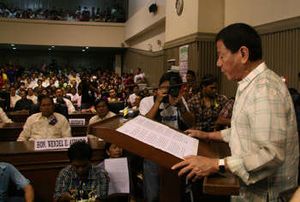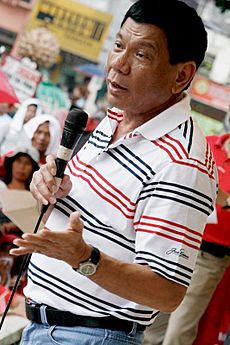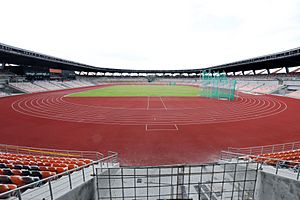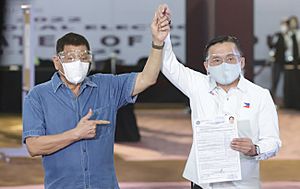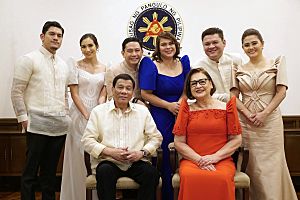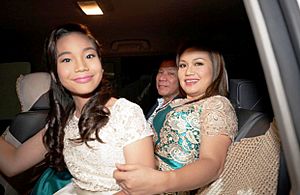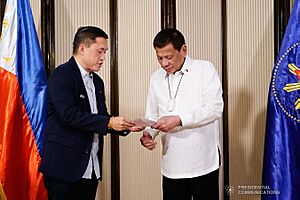Rodrigo Duterte facts for kids
Quick facts for kids
Rodrigo Duterte
|
|
|---|---|
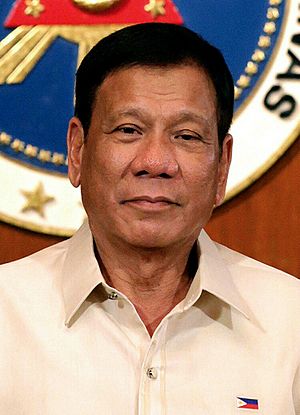
Official portrait, 2016
|
|
| 16th President of the Philippines | |
| In office June 30, 2016 – June 30, 2022 |
|
| Vice President | Leni Robredo |
| Preceded by | Benigno Aquino III |
| Succeeded by | Bongbong Marcos |
| 19th Mayor of Davao City | |
| In office June 30, 2013 – June 30, 2016 |
|
| Vice Mayor | Paolo Duterte |
| Preceded by | Sara Duterte |
| Succeeded by | Sara Duterte |
| In office June 30, 2001 – June 30, 2010 |
|
| Vice Mayor | Luis Bonguyan (2001–07) Sara Duterte (2007–10) |
| Preceded by | Benjamin de Guzman |
| Succeeded by | Sara Duterte |
| In office February 2, 1988 – March 19, 1998 |
|
| Vice Mayor | Dominador Zuño Jr. (1988–92) Luis Bonguyan (1992–95) Benjamin de Guzman (1995–98) |
| Preceded by | Jacinto Rubillar (OIC) |
| Succeeded by | Benjamin de Guzman (acting) |
| Vice Mayor of Davao City | |
| In office June 30, 2010 – June 30, 2013 |
|
| Mayor | Sara Duterte |
| Preceded by | Sara Duterte |
| Succeeded by | Paolo Duterte |
| In office May 2, 1986 – November 27, 1987 Officer in Charge |
|
| Mayor | Zafiro Respicio |
| Preceded by | Cornelio Maskariño (OIC) |
| Succeeded by | Gilbert Abellera (OIC) |
| Member of the House of Representatives from Davao City's 1st district | |
| In office June 30, 1998 – June 30, 2001 |
|
| Preceded by | Prospero Nograles |
| Succeeded by | Prospero Nograles |
| Chairman of Partido Demokratiko Pilipino | |
| Assumed office February 7, 2016 |
|
| President | Koko Pimentel Manny Pacquiao Alfonso Cusi Jose Alvarez Robin Padilla |
| Preceded by | Ismael Sueno |
| Chairman of the Davao City Liberal Party | |
| In office 2009 – February 21, 2015 |
|
| Preceded by | Peter Laviña |
| Personal details | |
| Born |
Rodrigo Roa Duterte
March 28, 1945 Maasin, Leyte, Philippine Commonwealth |
| Political party | Partido Demokratiko Pilipino (1998–2009; 2015–present) Hugpong sa Tawong Lungsod (local party; 2011–present) |
| Other political affiliations |
Liberal (2009–15) Nacionalista (1990–98) Lakas ng Dabaw (1988) |
| Spouse |
Elizabeth Zimmerman
(m. 1973; annulled 2000) |
| Domestic partners | Honeylet Avanceña (c. 1996–present) |
| Relations | Duterte family |
| Children | |
| Parents | Vicente Duterte Soledad Roa |
| Residence | Davao City |
| Education | Holy Cross College of Digos (secondary) |
| Alma mater | Lyceum of the Philippines University (BA) San Beda College (LL.B) |
| Signature | |
Rodrigo Roa Duterte KGCR (born March 28, 1945), also known as Digong, Rody, and by the initials DU30 and PRRD, is a Filipino lawyer and politician. He served as the 16th president of the Philippines from 2016 to 2022.
He is the only president in the history of the Philippines not to declare his assets and liabilities. Duterte's popularity and approval rating stayed high during his time as president. By the end of his term, he was the most popular post-People Power Revolution president.
Contents
Early Life and Education
Rodrigo Roa Duterte was born on March 28, 1945, in Maasin, Southern Leyte. His father, Vicente Gonzales Duterte, was a lawyer. His mother, Soledad Gonzales Roa, was a schoolteacher and community leader. Duterte has said that his grandfather was Chinese. He has four siblings: Eleanor, Jocelyn, Emmanuel, and Benjamin.
Duterte's father was a mayor and later a governor. His cousin, Ronald, was also a mayor. The Duterte family moved to Mindanao in 1948 and settled in the Davao Region in 1950.
School and Law Career
Duterte went to elementary school in Maasin and Davao City. He finished high school at Holy Cross College of Digos in Digos. He had been expelled from two previous schools due to his behavior. In 1968, he earned a Bachelor of Arts degree in political science from the Lyceum of the Philippines University in Manila.
He then studied law at San Beda College of Law and became a lawyer in 1972. Before becoming a politician, Duterte worked as a prosecutor in Davao City from 1977 to 1986.
Political Journey
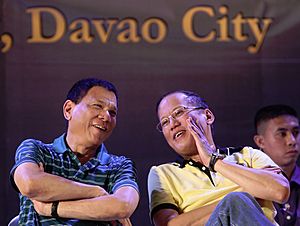
Duterte became vice mayor and then mayor of Davao City after the 1986 People Power Revolution. He served as mayor for over 22 years. During his time, Davao City became known as a safer and more business-friendly place.
His campaign for president in 2016 led to his election victory.
Presidency (2016–2022)
| Presidential styles of Rodrigo Duterte |
|
|---|---|
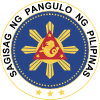 |
|
| Reference style | President Duterte, His Excellency (rarely used) |
| Spoken style | Your Excellency (rarely used) |
| Alternative style | Mr. President, President Mayor |
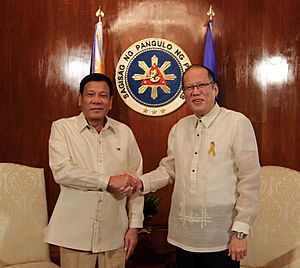
Duterte became the sixteenth president of the Philippines on June 30, 2016. He was 71 years old, making him the oldest person elected to the presidency.
During his presidency, his main focus was on fighting crime and corruption. He also worked to address terrorism and communist groups. He started a huge infrastructure program and made changes to economic rules. He also tried to make government processes simpler. He proposed changing to a federal system of government, but this did not happen.
He also led the government's efforts during the COVID-19 pandemic. He aimed for an "independent foreign policy," which meant strengthening ties with countries like China and Russia.
Economic Plans
Duterte's economic plans were called DuterteNomics. These plans included tax reform, building new structures, and helping people in need. The goal was to help the Philippines grow economically and become a high-income country.
He made changes to attract foreign investors. For example, he signed laws allowing foreigners to own more of local businesses and public services like airports and railways.
He also reformed the tax system. The Tax Reform for Acceleration and Inclusion Law (TRAIN Law) meant people earning less than ₱250,000 a year paid no income tax. But it raised taxes on items like vehicles and sugary drinks. These new taxes helped fund the government's big infrastructure program. He also lowered corporate income taxes to attract more businesses.
Building New Infrastructure
To help reduce poverty and improve the economy, the Duterte administration started the Build, Build, Build program in 2017. This program aimed to greatly increase spending on public infrastructure. It included projects like the Subic-Clark Railway, the Metro Manila Subway, and the expansion of Clark International Airport.
By April 2022, 12 major projects were finished, and 88 more were well underway. Overall, thousands of kilometers of roads and bridges, flood control projects, and classrooms were completed.
Energy and Climate
At first, Duterte's government focused on using different energy sources, including coal. He noted that the Philippines' carbon footprint was small compared to larger countries.
Later, his government shifted to prefer renewable energy. In 2019, he ordered a reduction in coal use. In 2020, a ban was placed on building new coal power plants. In 2022, he approved including nuclear power in the country's energy mix.
Duterte signed the Paris Agreement on Climate Change in March 2017. He said that rich countries, which produce the most carbon emissions, should help smaller countries affected by climate change.
Making Government Simpler
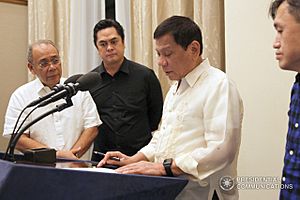
Duterte worked to reduce red tape in the government. He wanted to make processes easier for the public. He issued an order for Freedom of Information, allowing citizens to get documents from government offices. This aimed to make the government more transparent.
In 2018, he signed the Ease of Doing Business Act. This law aimed to make it easier to start and run businesses by reducing processing times and cutting down on bureaucracy. He also set up the 8888 Citizens' Complaint Hotline in 2016. This allowed people to report complaints about government services or corruption.
Health Care Improvements
Duterte promised to improve the health care system. In 2019, he signed the Universal Health Care Act. This law automatically enrolls all Filipinos in the government's health insurance program. He also signed laws to make cancer treatment more accessible and to provide free mental health services.
He also ordered the full use of the Reproductive Health Law. He banned smoking in public places across the country. He also set a price cap on certain medicines to make them more affordable.
Education Initiatives
In 2017, Duterte signed the Universal Access to Quality Tertiary Education Act. This law provides free college education in all state universities and colleges nationwide. He also signed a law allowing foreign universities to offer degree programs in the Philippines. This aimed to bring international quality standards to the country. He also created medical scholarships for students.
In 2021, he approved a law for the alternative learning system (ALS). This provides free education to those who are out of school. In 2022, he enacted a law for inclusive education for learners with disabilities.
In 2020, Duterte signed a law to create the country's first National Academy of Sports in New Clark City.
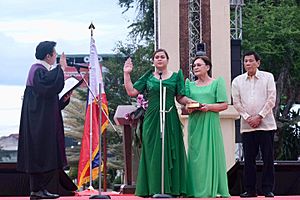
Duterte initially considered running for vice president in the 2022 election. However, in October 2021, he announced his retirement from politics. He later filed to run for senator but withdrew his candidacy in December.
After the Presidency (2022–present)
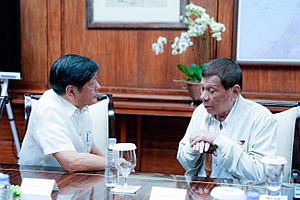
After his term ended, Duterte returned to Davao City. He kept a low profile until January 2023. He then resumed hosting his weekly show, Gikan sa Masa, Para sa Masa (From the Masses, For The Masses), on SMNI.
Personal Life
Duterte enjoys big bikes. He once owned a second-hand Harley-Davidson and a Yamaha Virago. He used to be a smoker but quit for health reasons. Duterte likes to read novels by Robert Ludlum and Sidney Sheldon. He is known for being direct and outspoken in public.
He has a local show in Davao City called Gikan sa Masa, para sa Masa. He is also a member of Lex Talionis Fraternitas, a fraternity from his law school.
Duterte is fluent in his native Cebuano, as well as Filipino and English.
Since being mayor, Duterte has a tradition of visiting children with cancer in Davao City and giving them Christmas gifts.
Family Life
Duterte's father, Vicente, passed away in 1968. His mother, Soledad, passed away in 2012 at age 95. His former partner, Elizabeth Abellana Zimmerman, was diagnosed with breast cancer in 2015.
Duterte was married to Elizabeth Zimmerman, a flight attendant, until 2000. They have three children: Paolo, Sara, and Sebastian. Paolo and Sara are involved in politics. Sara was elected Vice President in 2022.
Duterte currently lives with his partner, Cielito "Honeylet" Avanceña, who is a nurse. They have one daughter named Veronica. Duterte has eleven grandchildren and two great-grandchildren.
Religious Views
Duterte has described himself as Christian.
Awards and Recognition
Duterte turned down an honorary doctor of laws degree from the University of the Philippines. On March 28, 2023, the Davao City Council declared March 28—Duterte's birthday—as "Duterte Day." This was to recognize his contributions to the city and the Philippines. In November 2023, he received an honorary Juris Doctor degree from his alma mater, San Beda College of Law.
National Awards
- Knight Grand Cross of Rizal (KGCR) – (2017)
- Awards for Promoting Philippines-China Understanding (APPCU), Hall of Fame – (2023)
International Awards
Duterte received an honorary doctorate degree for international relations from the Moscow State Institute of International Relations in October 2019.
 Malaysia
Malaysia
 Johor: Grand Knight of The Most Esteemed Order of Sultan Ibrahim of Johor, 1st Class (SMIJ) – Dato' (2019)
Johor: Grand Knight of The Most Esteemed Order of Sultan Ibrahim of Johor, 1st Class (SMIJ) – Dato' (2019)
 Brunei
Brunei
- Sultan of Brunei Golden Jubilee Medal – (2017)
Images for kids
-
Duterte (2nd from right) presides over a meeting with the NTF-ELCAC at the Malacañang Palace on April 15, 2019.
-
Duterte with Russian President Vladimir Putin in Moscow, May 2017
-
Duterte meets with the Filipino community in Jakarta, September 9, 2016.
-
Duterte with US President Donald Trump in Manila, November 2017
See also
 In Spanish: Rodrigo Duterte para niños
In Spanish: Rodrigo Duterte para niños
- List of presidents of the Philippines
- List of presidents of the Philippines by previous executive experience
- Political positions of Rodrigo Duterte


